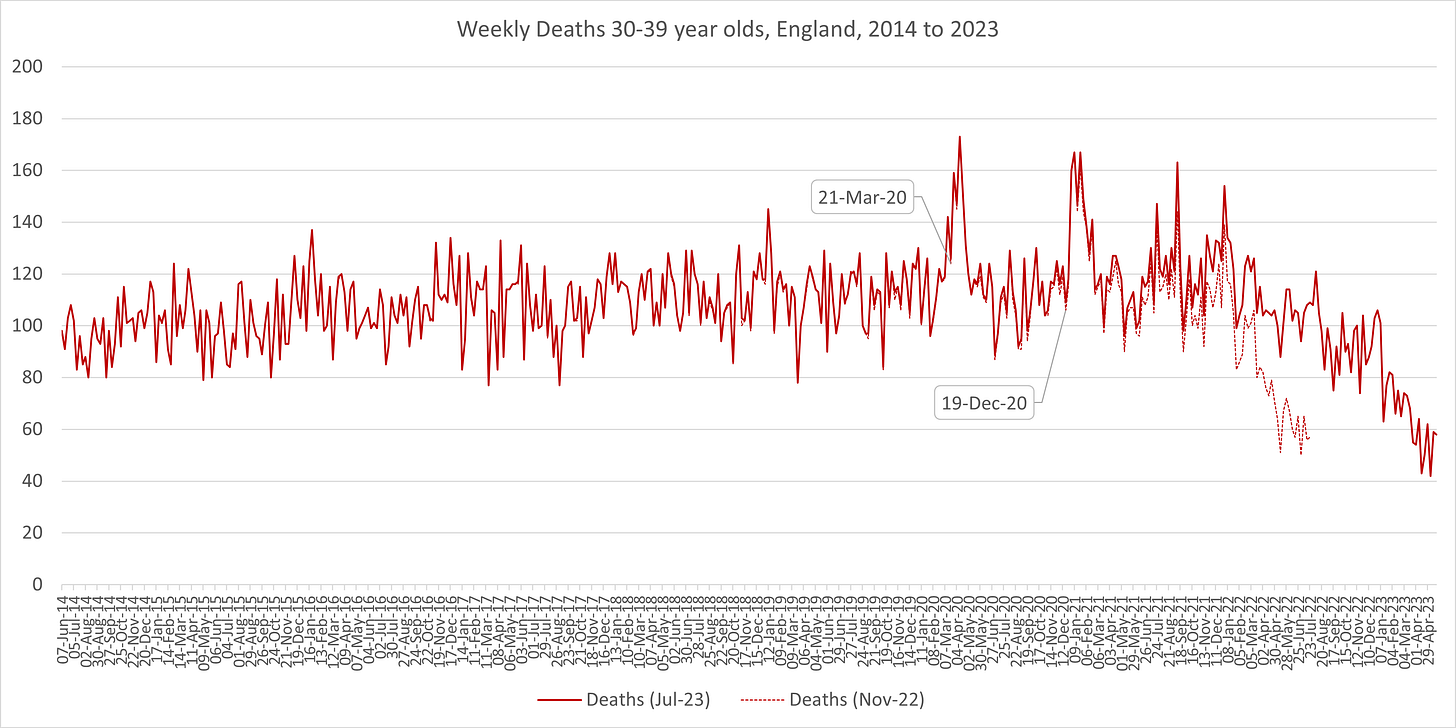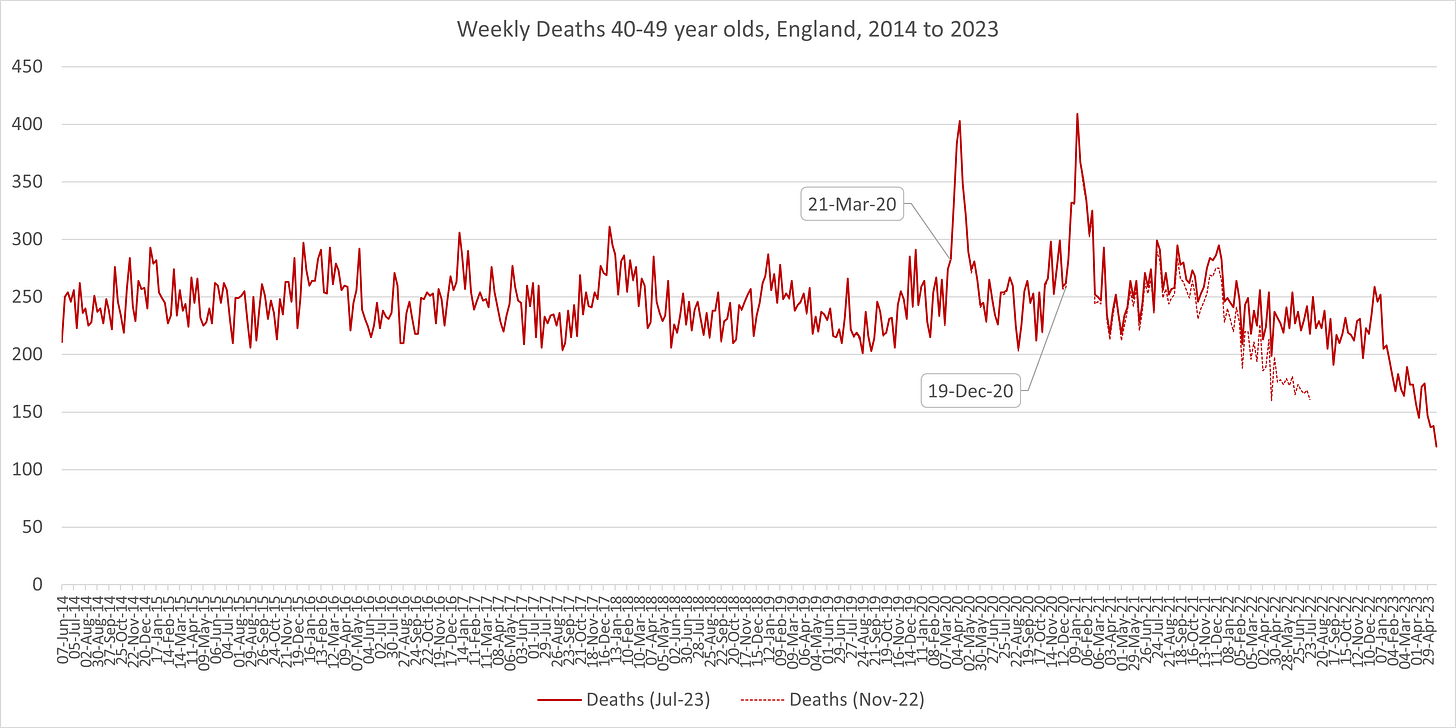Back in March last year, I wrote a comprehensive piece, analysing life-years lost in England:
The True Mortality Cost of COVID and COVID Interventions
All deaths are equal, but some deaths are more equal than others. Given that we are playing out the plot of George Orwell’s “1984”, I thought I would take the liberty of paraphrasing one of his other famous quotations. My apologies! It is still a mystery to me that the public health and statistics authorities still publish analysis and research based on numbers of deaths.
Life-years lost is the most appropriate mortality metric to use since it obviously takes expected remaining life into consideration. In other words, “death” itself is a meaningless statistic. Strictly speaking “loss of life” conveys the essence of what is important.
In the last few days, there has been an increase in analyses, focused on this metric which is good, and so, I was asked to revisit my own life-years lost analysis with updated data.
Alas, all the other analyses are relying on ONS data and UK govt agency analysis, using date of registration, rather than date of actual occurrence, rendering them useless at best.
Strange as it may seem (to me at any rate, given that I put out an hour-long presentation on this back in 2020, hosted by Ivor Cummins), many people still don’t understand the dire consequence of this, not least the upper echelons of the ONS themselves1.
So, for anyone making claims about excess deaths now, relying on deaths by date of registration, I’ll tell you plainly again, all you are doing is measuring the (in)efficiency of the death recording process in the UK.
Deaths appearing in the register now are simply deaths that actually occurred as much as 18 months ago. If there is an increase in such registrations now, it is simply a measure of the coroner’s activity in dealing with historic cases, potentially nothing more.
To illustrate the point, I have done a cursory analysis of the dataset I requested last year, correctly publishing deaths by date of occurrence and age.
Fortunately, someone else paid to have the dataset extended from my original date of July 2022 to May 2023 so I didn’t waste my money on something that the ONS should be publishing routinely for free, in spite of its failings as I articulated in my letters to them.
Looking at deaths of 19 to 29 year olds (in the chart above), we can clearly see the extent of deaths that have not yet appeared in the mortality dataset, as they taper off substantially in recent months. Alas, that isn’t a miracle improvement in public health, as you can see how the missing deaths from my Nov ‘22 dataset eventually appear in the July ‘23 one.
How on earth can you produce a reliable mortality analysis when so many deaths are missing from the dataset?? And, no, sorry, that is not an argument in favour of using the registration-date dataset. The deaths are inevitably missing from that dataset too.
And again, to stress the point, when these deaths do eventually appear (currently at a rate of 27 per week on average), we are now looking at a delay of closer to 18 months, compared to the 12 months last time I measured this. That means, the registration date dataset is up to 18 months out-of-date. “Up to” because these deaths are spread out over a period that no-one knows, compounding the issue, but certainly nowhere near the time that they actually occurred.
And yet, it’s these deaths that are most important. If an event triggers a mortality spike and all those deaths are referred to the corroner as “unexpected” then, of course, it’s those very deaths that we are most interested in - when they actually happened, not when they were eventually registered!
The new data reinforces the conclusions I drew in the original analysis but, otherwise, I can't improve upon it.
Inevitably, it’s the same issue as you go up through the ages, as you can see in the three charts above.
It’s not until you hit the 50+ year olds that it is evident that the backlog is less than 6 months, still not reliable by any stretch2.
And, now clearly, the true mortality triggers stand out (in the occurrence-date dataset!), most notably 21-Mar-20 and 19-Dec-20, not coincidentally the two weeks that the UK government intervened drastically into public health:
first by completely disrupting the healthcare system and usual treatment protocols; and then
by the mass injection of a novel therapy without informed consent.
The consequences are apparent and certainly not befitting the expected impact of a respiratory pathogen, as observed in prior years.
So, I’m sorry to burst the bubbles of those making unfounded claims about excess mortality and life-years lost in the current period, especially in the younger age groups. You haven’t got the complete data and what you do have is completely erroneous, since it is littered with deaths that don’t belong there.
Nevertheless, when I say there’s “nothing to see here”, it’s not because people aren’t dying. On the contrary, the “unexpected” death count continues to outpace the coroner’s ability to process them all. There’s simply nothing to see, yet… because the deaths simply haven’t been recorded, yet… even though they obviously have already occurred. We don’t need the coroner to confirm the cause of death to include them in the mortality dataset. Someone else want to try talking sense into the public authority?
But, not to worry, the ONS says it isn’t a problem, the coroner is doing a fabulous job, and all their analyses are reliable.
Trust the authorities!
N.B. I might have misunderstood but I also believe that after a certain time, the ONS creates an “final” dataset for a particular year, after which no more deaths are added when they are eventually reported.











Gosh but you're sooooo out of date! The narrative has moved on, through Ukraine valiantly fighting for our democracy to Joe Biden and his creepiness to Inflation! and Energy Prices! to NetZero! to Climate Catastrophe. We're all going to die from sunshine!!!! Which will explain all the excess deaths currently going on. Nobody's got the time to deal with excess deaths caused by reactions to a cold virus when the planet is burning and the wrong sort of people keep using cars and aeroplanes and gas boilers. (of course, it means that people can keep dying and nobody will be held accountable but, hey, Bill Gates made some money so...)
This is going to play out over years. Pfizer and the other prifiteers will be counting their money. POTUS--in the U.S.--and whatever the appropriate functionary is in other countries, will be out on the lecture circuit, getting paid to speak. The shitheads won, for better or worse, for now. Hopefully, with your continued presentation of this type of insight, we can prevent subsequent dumpster fires.